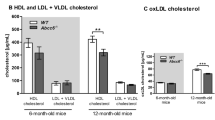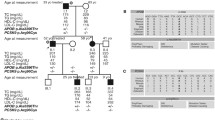Abstract
Autosomal dominant hypercholesterolemia (ADH; OMIM144400), a risk factor for coronary heart disease, is characterized by an increase in low-density lipoprotein cholesterol levels that is associated with mutations in the genes LDLR (encoding low-density lipoprotein receptor) or APOB (encoding apolipoprotein B). We mapped a third locus associated with ADH, HCHOLA3 at 1p32, and now report two mutations in the gene PCSK9 (encoding proprotein convertase subtilisin/kexin type 9) that cause ADH. PCSK9 encodes NARC-1 (neural apoptosis regulated convertase), a newly identified human subtilase that is highly expressed in the liver and contributes to cholesterol homeostasis.


Similar content being viewed by others
References
Varret, M. et al. Am. J. Hum. Genet. 64, 1378–1387 (1999).
Hunt, S.C. et al. Arterioscler. Thromb. Vasc. Biol. 20, 1089–1093 (2000).
Seidah, N.G. et al. Proc. Natl. Acad. Sci. USA 100, 928–933 (2003).
Brown, M.S. & Goldstein, J.L. Proc. Natl. Acad. Sci. USA 96, 11041–11048 (1999).
Elagoz, A., Benjannet, S., Mammarbassi, A., Wickham, L. & Seidah N.G. J. Biol. Chem. 277, 11265–11275 (2002).
Ruoslahti, E. Annu. Rev. Cell. Dev. Biol. 12, 697–715 (1996).
Acknowledgements
We are indebted to the family members for their cooperation and to C. Mugnier for expert assistance in computing the statistics. This work was supported by grants from Progrès-Institut National de la Santé et de la Recherche Médicale, Pfizer, Fondation de France, Comité Français de Coordination des Recherches sur l'Athérosclérose et le Cholestérol and Canadian Research grants (to N.G.S.). M.A. was supported by grants from Société Française d'Athérosclérose, Comité Français de Coordination des Recherches sur l'Athérosclérose et le Cholestérol, Fondation de la Recherche Médicale, Université René Descartes, Conseil de Recherche de l'Université Saint-Joseph. M.V. was supported by a grant from Société Française d'Athérosclérose and Pfizer. L.V. and D.A. were supported by grants from Ministère de l'Education Nationale de la Recherche et de la Technologie.
Author information
Authors and Affiliations
Corresponding author
Ethics declarations
Competing interests
The authors declare no competing financial interests.
Rights and permissions
About this article
Cite this article
Abifadel, M., Varret, M., Rabès, JP. et al. Mutations in PCSK9 cause autosomal dominant hypercholesterolemia. Nat Genet 34, 154–156 (2003). https://doi.org/10.1038/ng1161
Received:
Accepted:
Published:
Issue Date:
DOI: https://doi.org/10.1038/ng1161
- Springer Nature America, Inc.
This article is cited by
-
Impact of PCSK9 inhibitors in glycaemic control and new-onset diabetes
Cardiovascular Diabetology (2024)
-
Targeting proprotein convertase subtilisin/kexin type 9 (PCSK9): from bench to bedside
Signal Transduction and Targeted Therapy (2024)
-
Efficient prime editing in mouse brain, liver and heart with dual AAVs
Nature Biotechnology (2024)
-
The Role of Genetics in Advancing Cardiometabolic Drug Development
Current Atherosclerosis Reports (2024)
-
Novel LDLR variants affecting low density lipoprotein metabolism identified in familial hypercholesterolemia
Molecular Biology Reports (2024)





